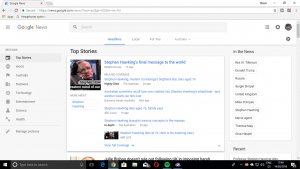Articles
ACCC targets tech platforms | InnovationAus.com
World watching ACCC inquiry into dominant tech platforms | The Australian (subscription required)
Australia: News and digital platforms inquiry | Advanced Television
My Comments
A question that is being raised this year is the impact that the big technology companies in Silicon Valley, especially Google and Facebook, are having on the global media landscape. This is more so in relationship to established public, private and community media outlets along with the sustainability for these providers to create high-quality news and journalistic content especially in the public-affairs arena.
It is being brought about due to the fact that most of us are consuming our news and public-affairs content on our computers, tablets and smartphones aided and abetted through the likes of Google News or Facebook. This can extend to things like use of a Web portal or “news-flash” functionality on a voice-driven assistant.
This week, the Australian Competition and Consumer Commission have commenced an inquiry into Google and Facebook in regards to their impact on Australian news media. Here, it is assessing whether there is real sustainable competition in the media and advertising sectors.
There is also the kind of effect Silicon Valley is having on media as far as consumers (end-users), advertisers, media providers and content creators are concerned. It also should extend to how this affects civil society and public discourse.
It has been brought about in response to the Nick Xenophon Team placing the inquiry as a condition of their support for the passage of Malcolm Turnbull’s media reforms through the Australian Federal Parliament.
A US-based government-relations expert saw this inquiry as offering a global benchmark regarding how to deal with the power that Silicon Valley has over media and public opinion with a desire for greater transparency between traditional media and the big tech companies.
Toni Bush, executive vice president and global head of government affairs, News Corporation (one of the major traditional-media powerhouses of the world) offered this quote:
“From the EU to India and beyond, concerns are rising about the power and reach of the dominant tech platforms, and they are finally being scrutinised like never before,”
What are the big issues being raised in this inquiry?
One of these is the way Google and Facebook are offering news and information services effectively as information aggregators, This is either in the form of providing search services with Google ending up as a generic trademark for searching for information on the Internet; or social-media sharing in the case of Facebook. Alongside this is the provisioning of online advertising services and platforms for online media providers both large and small. This is infact driven by data which is being seen as the “new oil” of the economy.
A key issue often raised is how both these companies and, to some extent, other Silicon Valley powerhouses are changing the terms of engagement with content providers without prior warning. This is often in the form of a constantly-changing search algorithm or News Feed algorithm; or writing the logic behind various features like Google Accelerated Mobile Pages or Facebook Instant Articles to point the user experience to resources under their direct control rather than the resources under the control of the publisher or content provider. These issues relate to the end user having access to the publisher’s desktop or mobile user experience which conveys that publisher’s branding or provides engagement and monetisation opportunities for the publisher such as subscriptions, advertising or online shopfronts..
This leads to online advertising which is very much the direction of a significant part of most businesses’ advertising budgets. What is being realised is that Google has a strong hand in most of the online search, display and video advertising, whether through operating commonly-used ad networks like Adsense, Adwords or the Google Display Network; or through providing ad management technology and algorithms to ad networks, advertisers and publishers.
In this case, there are issues relating to ad visibility, end-user experience, brand safety, and effective control over content.
This extends to what is needed to allow a media operator to sustainably continue to provide quality content. It is irrespective of whether they are large or small or operating as a public, private or community effort.
Personally I would like to see it extend to small-time operators such as what represents the blogosphere including podcasters and “YouTubers” being able to create content in a sustainable manner and able to “surface above the water”. This can also include whether traditional media could use material from these sources and attribute and renumerate their authors properly, such as a radio broadcaster syndicating a highly-relevant podcast or a newspaper or magazine engaging a blogger as a freelance columnist.
Other issues that need to be highlighted
I have covered on this site the kind of political influence that can be wielded through online media, advertising and similar services. It is more so where the use of these platforms in the political context is effectively unregulated territory and can happen across different jurisdictions.
One of these issues was use of online advertising platforms to run political advertising during elections or referendums. This can extend to campaign material being posted as editorial content on online resources at the behest of political parties and pressure groups.
Here, most jurisdictions want to maintain oversight of these activity under the context of overseeing political content that could adversely influence an election and the municipal government in Seattle, Washington want to regulate this issue regarding local elections. This can range from issues like attribution of comments and statements in advertising or editorial material through the amount of time the candidates have to reach the electorate to mandatory blackouts or “cooling-off” periods for political advertising before the jurisdiction actually goes to the polls.
Another issue is the politicisation of responses when politically-sensitive questions are being posed to a search engine or a voice-driven assistant of the Amazon Alexa, Apple Siri or Google Assistant kind. Here, the issue with these artificial-intelligence setups is that they could be set up to provide biased answers according to the political agenda that the company behind the search engine, voice-driven assistant or similar service is behind.
Similarly, the issue of online search and social-media services being used to propagate “fake news” or propaganda disguised as news is something that will have to be raised by governments. It has become a key talking point over the past two years in relationship with the British Brexit referendum, the 2016 US Presidential election and other recent general elections in Europe. Here, the question that could be raised is whether Google and Facebook are effectively being “judge, jury and executioner” through their measures or whether traditional media is able to counter the effective influence of fake news.
Conclusion
What is happening this year is that the issue of how Silicon Valley and its Big Data efforts is able to skew the kind of news and information we get. It also includes whether the Silicon Valley companies need to be seen as another influential media company and what kind if regulation is needed in this scenario.






